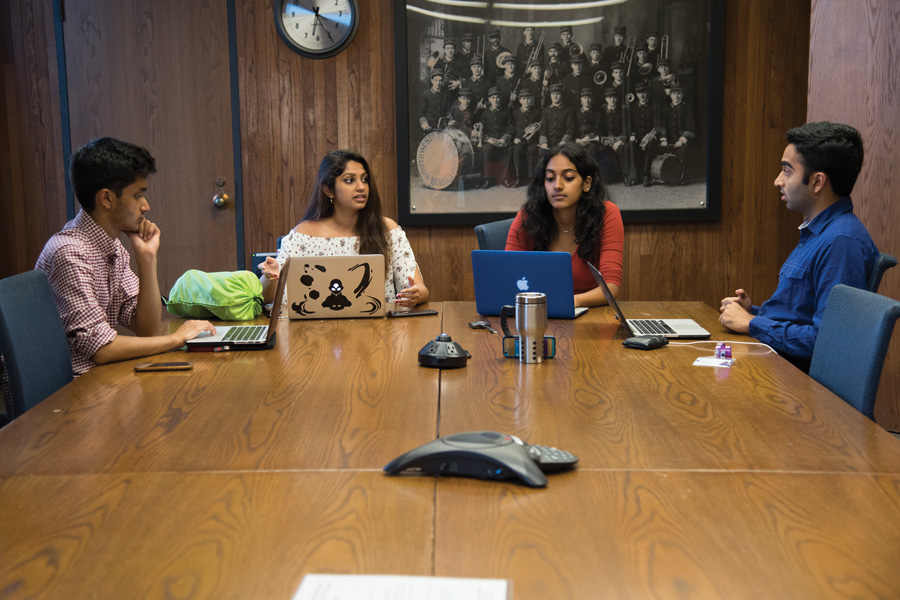New student group fights mental health stigma in Indian American community
Allie Goulding/Daily Senior Staffer
Shyam Mani, Aishwarya Chenji, Dhivya Sridar and Archit Baskaran hold a meeting in Norris University Center. I-AM SHAKTI was founded to provide support and education about mental illness primarily in the Indian American community.
September 21, 2017
When Weinberg junior Dhivya Sridar had an eating disorder last year, she said it was her close support group on campus, including her friends, professors and therapist, that helped her recover.
Though she felt supported, Sridar said she knew that many Indian Americans struggling with mental illnesses still felt stigmatized.
Sridar teamed up with five other students to create I-AM SHAKTI, a social justice organization that plans to launch this fall.
The group — founded by Sridar, McCormick freshman Shyam Mani, School of Communication junior Aishwarya Chenji, Feinberg first-year student Archit Baskaran, University of Wisconsin junior Ragashree Komandur and Feinberg first-year student Mohan Ravi — plans to create dialogue that provides comfort to those with mental illness while educating communities to become better support groups.
“Our goal is to provide a forum for Indian Americans — who are recovering from mental illness — to join together and stand in solidarity with one another in face of these obstacles, in terms of parents not understanding or support systems not being aware,” Sridar said. “And another aspect of it is sensitizing parents and communities in what we’re going through.”
Though the group includes South Asian and Asian-American voices, its focus is on the mental health of Indian Americans, Sridar said.
Indian Americans come from two distinct cultural backgrounds and many grow up in a culturally enriched environment, Komandur said. She said Indian Americans must address their distinct culture and continue to embrace it as their identity but also find ways to “thrive in this community as Americans.”
Komandur said some parents may be insensitive to mental health issues, so there is a need to educate them on the subject while also understanding their cultural background.
“Especially being from Milwaukee, we have a pretty big Indian community, and it’s hard to separate yourself from your culture, so people are living two lives,” she said. “We should embrace and explain our situation and how we should get the help we need to continue to be this singular identity that is Indian American and not have to live two distinct lives.”
I-AM SHAKTI plans to create forums that consist of parental support groups, Sridar said. In the group, parents who have recently found out about their child’s mental illness can ask questions and seek advice. Sridrar, who who said she felt supported by her own parents, said she hopes this sensitizes other parents to mental health challenges.
The group will also create a forum for those with mental illness to express themselves creatively through written stories, art, music, videos or dance, Sridar said. It also aims to build a network of culturally competent therapists who understand the additional struggles associated with the stigma surrounding mental health in Indian American communities, she said.
The group aims to grow into a national social justice movement, beyond just Northwestern and the University of Wisconsin, Mani said.
“It expands a lot more beyond college kids, and that’s something I really want to emphasize,” he said. “It’s all ages — anyone and everybody.”
Correction: A previous version of this story misspelled Dhivya Sridar’s name and misidentified the school of Aishwarya Chenji. Chenji is a Communication junior. The Daily regrets the errors.
The story was updated Thursday at 7:55 p.m. to include that Sridar felt supported by her parents.
Email: catherinekim2020@u.northwestern.edu
Twitter: @ck_525



